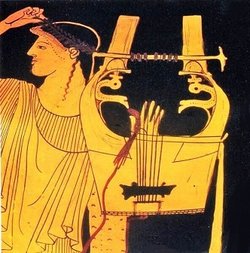The tyrant of Syracuse, Dionysius I (died 367 BCE), liked having intellectuals and creative types in his court. Plato the philosopher, Philistus the historian, and Philoxenus the poet were in his circle at various times.
Yet the tyrant was capricious—especially when he thought his own literary accomplishments were under-appreciated. Philoxenus once voiced a negative opinion about Dionysus’s poetry—and the tyrant had him arrested and sent to the quarries for hard labor.

The next day, though, Dionysius had him released. (Philoxenus’s friends’ strong protests helped).
At another poetry reading, Dionysius read some of his own work. The audience expressed appreciation and applauded. Dionysius made a point of asking Philoxenus directly how he liked it.
The poet stood, turned to the guards, and said “Take me back to the quarries.”
Sources: Plutarch’s On the Fortune of Alexander and Diodorus Siculus’ Bibliotheca Historica have versions of this tale.
Related: Athena’s punishment of Arachne for her challenge and the beginnings of moral philosophy. In the Philosophers, Explained series.